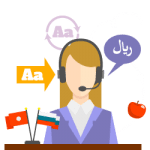Translation and localization services: translate your content
With the expansion of the online audience, especially in Asia, Middle East and Latin America, more companies have started to understand that translation and localization services play an important role in business expansion to foreign countries. As such, they started to reach out to customers in areas like blogs, websites and social media platforms by using accurate translation services.
The fact that 58% of the 500 largest companies in the world have used website translation and localization shows the power of this practice on any business. For this to be most effective, you could follow some of these steps:
The message
Find the message that represents your product or service the most. It is also ideal if your message doesn’t need a radical change when translated. A good example for that would be McDonalds’ message “I’m lovin’ it” which, even translated, it doesn’t need a change in meaning. The only aspect that needs localized is the context in which it is put.
Translate product descriptions and specs
According to recent research done by Common Sense Advisory, 85% of respondents were hesitant on making a purchase of a product that didn’t have specifications in their first language. At the same time you must also make sure that your translated content is accurate and easy to understand. For this to be done, you need to make sure that:
- The company that offers you their translation services employ native-speaking translators
- Be aware of the differences of dialects of the same language, but from different countries.
- The best option is to create separate websites for each country.
Localization
Localisation is a very important process for crossing cultural borders and it must be applied not only to your message but also to the predominant colors. There are different color meanings in each country which makes it very important which colors you use so that it completes your brand’s message.
Use social media
Taking advantage of social media platforms has become almost “a must” for every company because of the large communities that they offer. In certain countries where Facebook and Twitter are banned, you can always find alternatives like QZone, Renren and Tencent Weibo. This type of situation is another reason why you should create separate versions of your website for each country.
Engaging to break cultural and linguistic barriers is not the easiest and cheapest thing to do, but it certainly is the most profitable in the long run. A lot of international companies are already using such services in order to better target foreign countries and if you really aim for a global audience you can’t miss out.
NordicTrans provides full translation and localization services of the highest quality at some of the lowest rates in the market and can help you expand your reach to any country.









